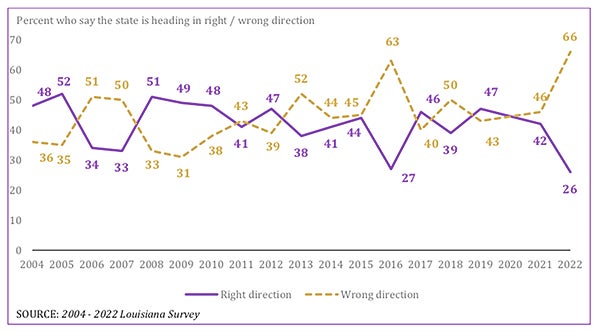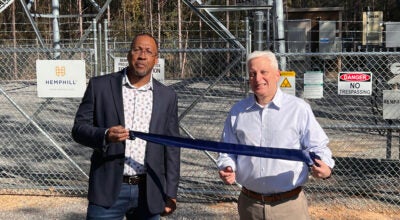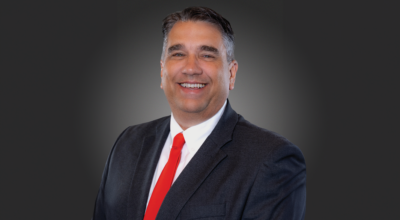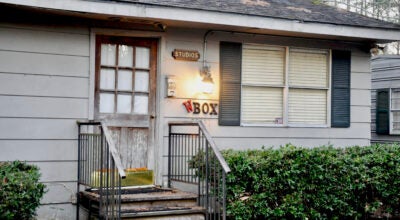State of despair: Survey suggests Louisiana headed in wrong direction
Published 12:51 pm Tuesday, April 12, 2022
|
Getting your Trinity Audio player ready...
|
For the first time since 2016, a majority of Louisiana residents believe the state is heading in the wrong direction.
A survey released Tuesday by the Reilly Center for Media and Public Affairs, part of LSU’s Manship School of Mass Communication, showed that two thirds of Louisiana residents now believe the state is taking a turn for the worse.
The report, the first of a six-part series on the annual Louisiana Survey, paints a negative picture about residents’ views of the state. The survey was based on phone interviews or online responses from 508 residents.
Only 26 percent of those surveyed say they think the state is going in the right direction. That is the lowest percentage since the Manship School began doing the annual survey in 2004.
The pessimism is widespread across political and demographic backgrounds. Seventy-one percent of Republicans report that they feel the state is headed in the wrong direction and 54 percent of Democrats agree with them. The numbers are closer among racial identities, with 68 percent of white and 61 percent of black respondents having a pessimistic view, as well as regionally, with 69 percent of South Louisiana residents and 64 percent of those living in North Louisiana having a negative view.
Louisiana residents’ faith in their government also fell to the lowest point since the survey began measuring it.
Only 25 percent of residents say they are either very confident or somewhat confident in the state government to address important problems effectively. This dropped from 41 percent in 2021 and is several points lower than its previous record low of 33 percent in 2006.
Survey respondents identified education, infrastructure and the economy as top issues.
The economy topped the list, with 35 percent of people identifying it as one of the top five most important issues and 14 percent identifying it as the most important issue.
The report indicates that this may be an undercount of residents who are concerned about the economy, as several issues, including economic inequality, the minimum wage and public assistance programs were not tallied as economic issues alongside jobs, inflation and income.
The survey also found that 41 percent of residents think they are worse off financially than they were a year ago, with just 21 percent of residents indicating that they believe that they will be in a better position in a year.
When asked to forecast the economic prospects for the state as a whole, 7 percent said they expect good business conditions a year from now, and 80 percent predicted that widespread depression and unemployment were more likely in the next five years than a good economy.
The survey indicates that Louisiana residents are largely split over the government’s handling of the pandemic.
Forty-one percent indicate that they approve of how the state handled the COVID-19 pandemic, with 39 percent disapproving. That is several points lower than last year, when 49 percent of residents reported approval.
Republicans make up the biggest shift, with those saying they approve of the state’s handling of the crisis falling from 39 percent to 24 percent from 2021 to 2022.
The survey also showed major splits in who received the COVID-19 vaccine.
Eighty-four percent of college graduates report being fully vaccinated, while 56 percent of non-college graduates report the same. Eighty-six percent of Democrats report being fully vaccinated, while 63 percent of Republicans and 56 percent of independents report being fully vaccinated.
Overall, 65 percent of respondents reported that they were fully vaccinated.
New Orleans residents are much more likely to be fully vaccinated than those in other parts of the state, with 75 percent of New Orleanians reporting being fully vaccinated. Baton Rouge falls behind the state average, with 56 percent of residents reporting being fully vaccinated.
Additionally, most of those surveyed are opposed to vaccine mandates. Sixty-two percent were opposed to employers mandating the vaccine, with 58 percent saying they opposed the state government requiring it for public employees.
Sixty-one percent oppose requiring children 12 and older to be vaccinated, and 67 percent oppose it for children aged 5-11.
The report indicates that political identity plays a major role in these attitudes, with over two thirds of Democrats supporting vaccine mandates for employees and students above the age of 12, and over half of Democrats supporting a mandatory vaccine for students aged 5-11.
In comparison, only 14 percent to 21 percent of Republicans support mandating the vaccine in any of these scenarios.
The entire survey can be viewed online at www.lsu.edu/manship/research/centers-labs/rcmpa/research/la_survey.php.
This article was written by Piper Hutchinson, for the LSU Manship School News Service.






